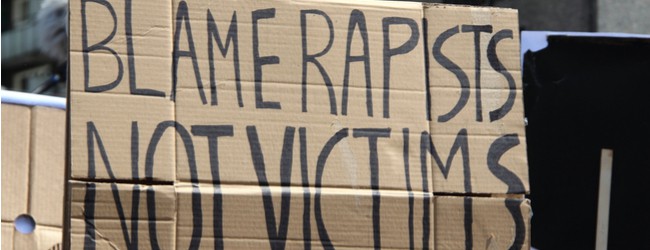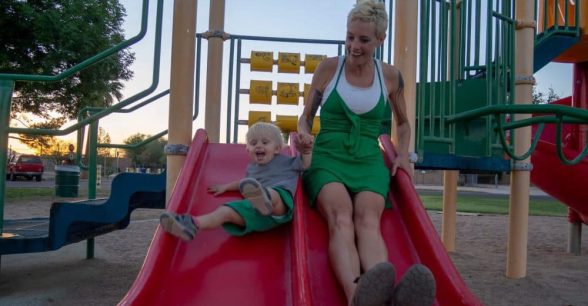Don’t Use “Functioning Labels” to Victim-Blame Me
Content note: this post discusses sexual abuse and rape.
When people find out that I survived a rape and my assailant was a woman, their tone often immediately shifts from sympathy to disbelief or confusion: “How could a woman rape you?” Besides the fact that this question erases sexual violence in the LGBTQIA+ community, it’s also an assumption that completely ignores my physical disability and the fact that I’m autistic. Non-disabled people often make biased, quick judgments about my capabilities, and don’t understand why I wouldn’t be able to physically escape a sexual assault if my rapist was female. I can often walk unassisted and only recently began using a cane, so people jump to the conclusion that I am a “high-functioning” disabled person.
Functioning labels, a concept that originated in the autistic community, are often used by non-disabled people to define the capabilities of disabled people. In the autistic community, people are generally split into categories—high-functioning and low-functioning—based on factors such as verbal ability, ability to live independently, and academic ability. Functioning labels are used to deny disabled people accommodations because they aren’t “disabled enough,” or deny them independence and free choice because they’re “too disabled.”
And functioning labels can be weaponized against disabled sexual violence survivors, particularly people with developmental and cognitive disabilities, highly stigmatized mental illnesses, multiple disabilities, or who communicate without using traditional verbal speech (like AAC users or non-verbal autistic people). They’re intrinsically a part of the way that disabled survivors are victim-blamed for our experiences.
“I’ve been told I was too mentally ill to understand what had really happened with my abuser,” says Victoria Lee, a fantasy author. “I’ve also been told, in the years since, that I am way too calm and composed while discussing my abuse. I never get the sense, when people say that, that it’s a compliment. What they mean is: Real victims would cry, real victims are broken, real victims can’t discuss their victimization.”
When it comes to disability, functioning labels aren’t a useful indicator of a person’s abilities and needs. It’s more accurate to describe exactly how someone’s disability impacts them—for example, because I have Ehlers-Danlos syndrome, I have low muscle tone and am prone to injuries—than to label someone as high- or low-functioning. When I’ve talked to people outside the disability community about how challenging it was for me to take a basic self-defense class, they sound skeptical, like they’ve already made assumptions about how my disability impacts my life and this doesn’t fit that image.
But these inaccurate labels are often used to deny survivors due process, including on college campuses, where research shows that 1 in 3 disabled women are the victims of sexual assault. For instance, when I initially reported my rape, which happened on a public university campus, to the campus police, the officer made me doubt myself. She questioned my abilities extensively, asking why I wasn’t physically able to get away from my female attacker and whether I’d had any alcohol that night. She only switched gears and seemed to believe that a woman could rape me when I explained that I was fairly certain I’d been drugged before it happened.
I’m hesitant to bring up the fact that I’m autistic when I talk about my history as a sexual assault survivor, even in circles where I feel comfortable discussing how my physical disability plays into that. People have asked me questions like, “Did you understand what your abuser was doing at the time?” and, “How can you be sure that she meant to assault you?”
People who are blaming the victim often turn to functioning labels, or assumptions about a disabled survivor’s abilities, to shift the blame off the abuser.. Denarii Monroe, a blues singer-songwriter, writer/editor, poet, screenwriter, and activist living with multiple disabilities, was sexually harassed a few months ago by her primary care physician’s colleague while her PCP was on vacation. “When she returned, I told her what happened and, essentially, she didn’t believe me,” says Denarii. “She chalked it up to me being overly sensitive and misinterpreting things because there was no way that this man she’d known for so long could do something like that.” Even relationships between friends, romantic partners, colleagues, and peers can have a power imbalance, because if you’re disabled or mentally ill and your abuser is not, they’re more likely to be believed and taken for their word. Phrases like ‘overly sensitive’ and ‘misinterpreting’ cast doubt that the disabled or mentally ill survivor fully understands their own experiences, solely or partly on the basis of their disability.
The victim-blaming response is, unfortunately, fairly universal for sexual violence survivors, but it’s weaponized in new ways against disabled survivors. We’re not only questioned on what we were wearing and whether we were drinking alcohol, but also things like how well we can hear our surroundings, whether or not we can walk, our emotional reactions after an assault, and how physically capable we are of performing the moves taught to us in Rape Aggression Defense programs at college.
Functioning labels are so often used against survivors when we come forward, not only formally, but also just in telling people in our communities and social networks about our experiences. We’re doubted, disbelieved, and treated with skepticism. We need genuine empathy for survivors with disabilities, and support systems who will advocate for these survivors: Lawyers, counselors, physicians, and more who will walk them through the process of healing and, if they want to, formally reporting their assault. Until we get there, the disability community will still be fighting for our place in the #MeToo movement.
About Rooted In Rights
Rooted in Rights exists to amplify the perspectives of the disability community. Blog posts and storyteller videos that we publish and content we re-share on social media do not necessarily reflect the opinions or values of Rooted in Rights nor indicate an endorsement of a program or service by Rooted in Rights. We respect and aim to reflect the diversity of opinions and experiences of the disability community. Rooted in Rights seeks to highlight discussions, not direct them. Learn more about Rooted In Rights



